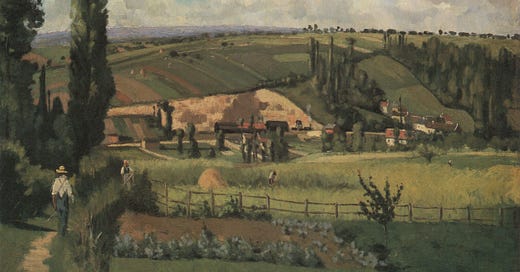Why and how I'm translating Genesis from the Hebrew into English verse
Introduction, background, and biases
Genesis stands above all other books. It is the beginning and head of Scripture, the text to which the rest of the Bible returns again and again, directly and indirectly. In it we discover world before world, world before man, and man before law; the archetypes of man and woman, brother and sister, mother, father, and child; the origin of nation and technology; and proper ordering of God, man, and nature.
The King James Bible remains the standard by which all other translations into English are judged. It’s beautiful and otherworldly. But what it fails to do is capture the brevity of the original Biblical Hebrew. The KJV Old Testament has roughly twice as many words as the Hebrew text.
Goals and methods
My primary goal as a translator is to make the beauty and brevity of the Hebrew Bible available to readers in English. To this end, I present the whole text as verse, even though most of the original is prose. Line breaks and spacing allow for a better economy of language. My secondary goal is to make different choices than translations in the lineage of the KJV, all of which tend to resemble each other closely.
The other reason I translate as verse is to match in form the primary theme of Genesis: ποίησις. The Septuagint translates the first verb (בָּרָא) as ἐποίησεν (ποιέω), which means to create, make, or produce. Ποιέω also means to compose poetry. The Nicene Creed begins with expressing belief in God the Father, maker (ποιητὴν) of heaven and earth. Like the dual meaning of ποιέω, ποιητής means both “maker” and “poet”. And so Genesis, the story of God’s creating and creation, is poetry in a more fundamental way than mere literary genre.
Beyond the form of verse, my translation is poetic in that it is concerned, whenever possible, with the sound and rhythm of the Hebrew. Like syntax and grammar, sound and rhythm are part of meaning. They constitute a kind of poetic “argument of the action” that is usually lost in the movement from one language to another.
I translate from the standard Biblia Hebraica Stuttgartensia text and rely on the insights of the Church Fathers and medieval rabbinic commentators, as well as modern philological tools and commentaries, and my main digital tool is Verbum. The other translations to which I pay closest attention are the Septuagint and the Clementine Vulgate. I ask the intercession of St. Jerome that my translation is good and true and an aid to all those who want to study and love Scripture.
Why now?
Francis Bacon began his 1620 New Organon with an epigraph from the prophet Daniel: “Many shall run to and fro, and knowledge shall increase.” That is, Bacon begins his founding of modern thinking with an announcement of the end of the world. Isaac Newton, another founder of modern thinking, wrote commentaries on Daniel and Revelation. Modern science began with an eye towards apocalypse. After 400 years of the project begun by Bacon and Newton, we’re searching again for new ways of thinking, and so we must stop looking toward the end and begin at the beginning. And so I translate Genesis in a new way so that we may look at it—and ourselves—anew.
Background and biases
I am an Orthodox Christian, but my training, formal and informal, in Hebrew and biblical studies has been primarily Jewish. I studied classical languages (Greek, Hebrew, Latin) at the University of Pennsylvania, where I completed an undergraduate thesis under Emily Wilson, translator of Homer and Seneca. I credit all that is good in this translation to my teachers, especially my Hebrew professor Michael Carasik, the friends with whom I studied Rashi and Maimonides at Penn Hillel, and my friends and tutors at the St. John’s College Graduate Institute. All errors are my own.
I am broadly skeptical of source criticism. My approach to the text is closer to that of Abraham ibn Ezra: “And now I will propound the basic principle of interpretation that applies to Scripture and Rabbinic literature alike: if we find one of three things—1) something contrary to reason, 2) one thing that contradicts another, or 3) something that contradicts authoritative tradition—then we must repair it by means of figurative interpretation, or by an explanatory gloss that observes the rules of language. And if we cannot repair it, we must acknowledge the deficiencies of our knowledge and ability. G-d forbid that we should find fault with the text, but neither should we believe that we ought to take it literally. We should, rather, believe that the author of the text knew its secret.”
Why subscribe?
I post my translation as I work on it, along with short commentary and notes on interesting and difficult words and passages. I post rabbinic and patristic commentaries on the passages I translate. In the future I may interview other translators and review other translations and related works. But the primary focus will always be the translation itself.
Once I finish translating Genesis I will continue to translate more of the Old Testament (and perhaps New Testament too). Translating the complete text of the Bible would take many many years, so there will be no shortage of work for the foreseeable future.
Sample posts:





